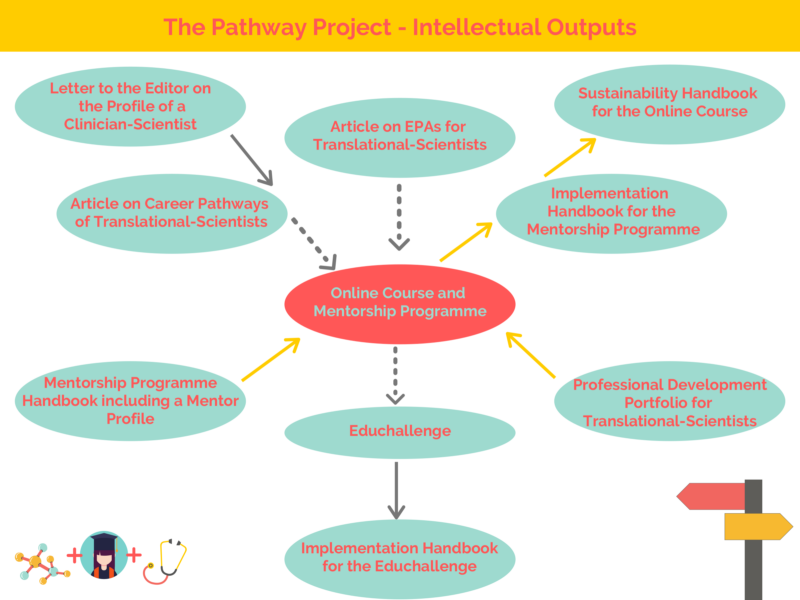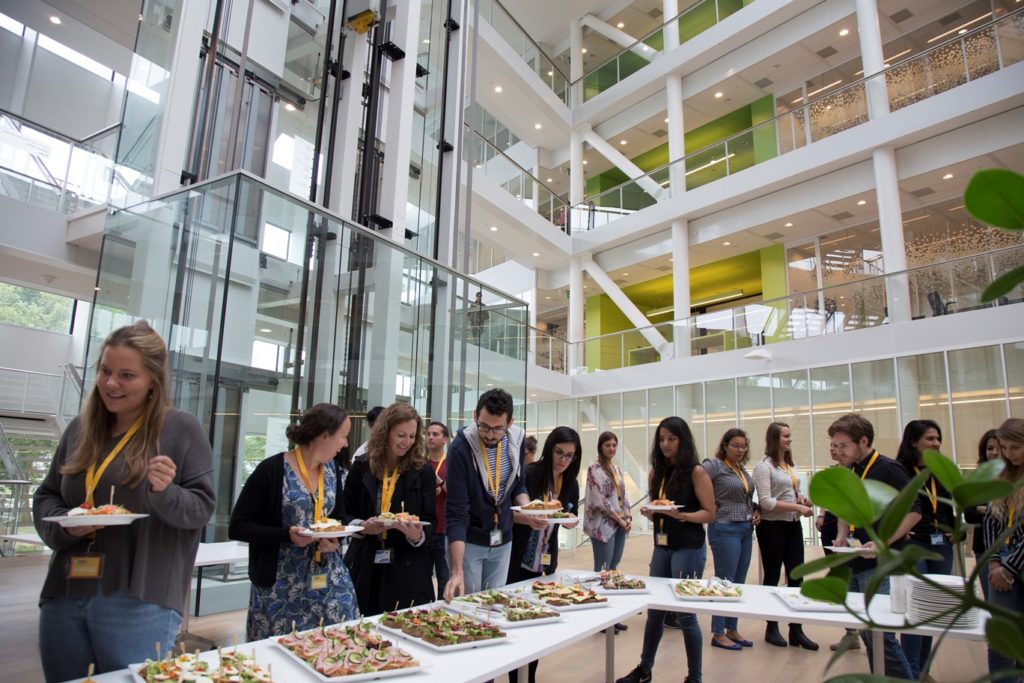The pathway project has come to an end. Here we present our final intellectual outputs:

Final Intellectual Outputs (link to pdf version)
The Pathway project is divided into three work packages, each consisting of one or more intellectual outputs.
Work package 1: Career pathways of the clinician-scientist
The first work package contains these outputs:
Career pathways of the clinician-scientist (IO 1)
An academic article will give insight into the complex and diverse careers of clinician-scientists and their day-to-day working life. It is important to describe this in detail in order to capture the full extent of what it means to be a clinican-scientist in today’s society. The article aims to illuminate internal and external struggles these professionals face, thereby raising awareness for their work across different stakeholders. Within translational medicine clinician-scientists form essential bridges between the clinic and research, with this article we wish to enhance recognition of this unique link.
Profile of the clinician-scientist (IO 2)
To elucidate the profile of a typical clinician-scientist, a letter to the editor has been drafted in which the on-going discussion of defining the term “clinician-scientist” is described. Our European project group pleads for a universal language within translational medicine in order to pinpoint specific supportive needs at undergraduate, graduate, and postgraduate level. Only when we speak the same language can we use the term clinician-scientist in a uniform manner and work towards designing specifically tailored extra-curricular training to aid these professionals.
Educhallenge and implementation (IO 9 & IO 11)
A Pathway Educhallenge is a workshop-type session in which a real-life clinical case is discussed from the perspectives of different stakeholders within translational medicine (e.g. patients, clinicians, reserachers, industry, insurance, government). The topics of clinical cases vary but are all highly complex, include unexpected twists, and demand compromise through fiery debate. The main learning objective is to appreciate other perspectives within the multidisciplinary field of translational medicine and to work together towards a common goal. The Pathway Educhallenge will be implemented during the Utrecht University Translational Medicine Summer Schools in the Netherlands.
Here there is a little video summary of the 2019 edition:
You can find the Educhallenge Implementation Handbook here (Spanish version here)
Work package 2: Mentorship programme
The second work package contains the following outputs:
Mentorship programme and implementation (IO 4 & IO 7)
A mentorship programme for clinician-scientists does not yet exist in Europe. Therefore, a mentorship programme has been developed which is currently connected to the yearly Translational Medicine Summer School in Utrecht, the Netherlands. Students first follow an online course on mentorship and are then matched with a more experienced clinician- or life-scientist as their mentor.
Here you can find the Mentorship programme implementation handbook (spanish version here).
Mentorship handbook and mentor profile (IO 5)
A mentorship handbook has been developed describing the setup of the mentorship programme (view mentorship handbook, and spanish version). The handbook includes tips and tricks for long-term mentorship that can help guide clinician-scientists throughout their whole training, which can take more than 10 years starting at Masters level. Mentors play an important role in the success of a mentor-mentee relationship. Therefore, a mentor profile is integrated in the handbook to facilitate the selection and matching process of mentors and students. A natural match between the mentor and student is necessary to start a successful mentorship relationship and we aim to facilitate this. Furthermore, this mentorship handbook can be used as a guide to develop a mentorship programme for clinician-scientists in other institutions after the life-time of the project.
Professional development portfolio for clinician-scientists (IO 6)
A professional development portfolio for students has been developed and is available for download here (spanish version here). This portfolio is integrated in the online course environment and can be used as preparation before the start of a mentorship session. It includes preparatory assignments focused on different aspects of self reflection and career planning. Every clinician-scientist will face crossroads during his or her career and this portfolio can provide guidance along the way.
Online course and implementation (IO 8 & IO 10)
The mentorship programme starts with a joint, international, online course which prepares students for their mentoring sessions and facilitates the matching process. During this course, the following topics are discussed: theory on mentorship, defining success, 21st century skills, and career pathways. As all participants of the Translational Medicine Summer School can sign up for the mentorship programme, both early career clinician- and life scientists can enroll. We believe that interaction between these two groups creates added value in this programme as their working environments are very much intertwined.
Candidate mentors must also follow a concise online module regarding mentorship to level the playing field and manage expectations. Towards the end of the online course, mentor and mentee are matched and introduced to each other. It is up to them to decide how they prefer to meet, however we require at least two (online) meetings a year.
The newly developed online course will be implemented after the yearly Utrecht University Translational Medicine Summer School. Students will be divided into mixed, international groups to foster international collaboration and networking. Each group has its own course environment. The groups will be supervised by a content expert from one of the project partners and by an e-moderator (didactical and technical e-learning expert). The estimated course duration is 2 weeks with a study load of 6 hours. Students will receive a certificate of attendance if they have successfully finished the course.
Work package 3: Entrustable Professional Activities for clinician-scientists
The third work package contains the following output:
Entrustable Professional Activities (EPAs) for clinician-scientists (IO 3)
Entrustable professional activities (EPAs) are currently used in the training of medical students around the world. However, the use of EPAs for clinician-scientists is a completely new concept. Which EPAs best describe research work or the combination of clinical and scientific duties is elucidated in a Delphi study with experts from the field of translational medicine. The outcomes of this study could be used to better the training of future clinician-scientists.

